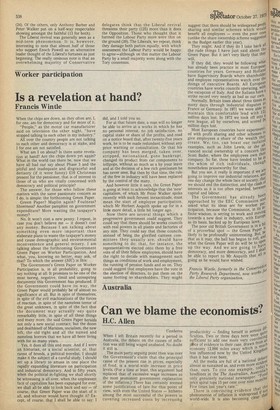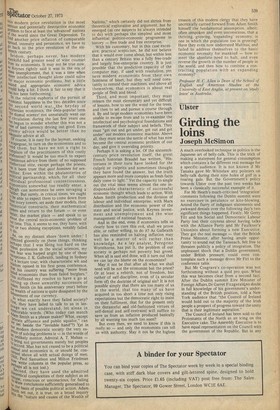Australia
Can we blame the economists?
H.C. Allen
Canberra When I left Britain recently for a period in Australia, the debate on the causes of inflation was still being waged unabated. No doubt It still is.
The main party arguing point then was over the Government's claim that the principal cause of the present rise in prices, especially of food, is a world-wide increase in price levels. (For a time at least, this argument had replaced that of excessive wage increases as the most prominent government explanation of the inflation.) There has certainly seemed some justification of late for this point of view, with even the United States — hitherto among the most successful of the powers in covering increased costs by increasing productivity finding — finding herself in serious
ficulties. Two or three days here were (10", sufficient to add one more very convincinei; pibce of evidence to their case, drawn r ah economy 12,060 miles away which is nilico less influenced now by the United Kingu° than it has ever been. All the media are full of a national debate as sustained as, and even more stridens than, ours. To cite one example. today,5 headlines. in the The Australian, Australi9od only genuinely national newspaper: "F°._s, price spiral tops 15 per cent over nine montn Five times last year's rate."he There is convincing evidence that t t phenomenon of inflation is widespread if till°0t world-wide. It is also becoming clear t lasiato r October 27, 1973 . IS modern price revolution is the most 'erious and potentially destructive economic Problem to face at least the 'advanced' nations ,of the world since the Great Depression. To 'ind another price inflation of comparable spread, intensity and persistence, we have to back to the price revolution of the sixLeenth century. Seldom, perhaps never, has modern frnankitid had greater need of wise counsel :rtIM its economists. It may not be true now, gs Keynes rightly said it was in the era of ilicaSS unemployment, that it was a time when sneer intellectual thought alone could solve the major economic problems, but a little Sound and appropriate economic advice Ill'iould help a lot. I think it fair to say that it
as not been forthcoming. ,
. In the relative euphoria of the pursuit of `Leemornic happiness in the two decades since tr second world war,.the heyday of ,„eYbesian economics, the once-popular term
Te dismal science' not unnaturally went out 21 circulation: during the last few years one ',!as begun to wonder whether this was not a ?a, e of bad currency driving out good. Even noomy advice would be better than no "uequate advice at all.
Of course, it is easy for the layman, seeking a s , eapegoat, to turn on the economists and to t'end them, but have we not a right to n4oPlain of the practitioners of this costly 111'rofession? It would be too much to expect „nanimous advice from them: of no supposed l'tellectual elite, except perhaps the priests, tas it been truer that quot homines tot sen'Moe. Even within the phalansteries of 1/0litical partisanship, which, for all their Ltdividual professional contentiousness, i',°,nomists somewhat too readily enter, a kmogh can sometimes be seen savaging a 't'aldor. But surely, in critical times, we ought ti°113e able to expect them to come down from tieir ivory towers, set aside their models, their :1eoretical constructs, their mathematical t4entes and return to the forum — or even „tter, the market place — and speak to us 7out the central socio-economic problem of time. This, it seems to me, they have, with ue or two shining exceptions, notably failed re,,Aa, on my distant shore 'down under,-' I 0"ected gloomily on these things, thinking 4rhaps that I was being too hard on the oltviest profession in the sbcial sciences, my e, n fear was harped aright by one of those to'reePtions. J. K. Galbraith, landing in Sydney a lecture tour, with characteristic wit and 'visa • th orn opined in his first press conference, ftvat his country was suffering "more from 411,ed economists than from failed burglars." 3„18.stiffened my resolve to have a go at i ,aring up these unworthy successors of Smith (in his anniversary year) before lelz Wealth of nations is quite dissipated by the ?asement of our currency. what exactly have they failed society? they have failed to talk to us in Ianwe can understand, let alone in Ateinlorable words. (Who today can match Smith as a phrase maker? What, except . y'„I'lvate affluence and public squalor," can ' , set beside the "invisible hand"?) Yet in
Air
sen Modern democratic society the very esan ce of solving problems is — in the words of to unlikely mentor, Admiral A. T. Mahan — t0 ,ring not governments merely but peoples stIr ecord. Man has not ceased to be a political eerrnal and economics is, or snould be, con(sthed above all with actual doings of men. t3r,111, Paul Samuelson and Milton Friedman 1:41vi write columns in the popular press, so s aPs all is not lost.) theecond, they have used the admitted )ccoretical complexities of their subiect as an tore, conscious or unconscious, for failing be ., aw conclusions sufficiently generalised to Lne basis of possible political action. Adam iri"toith set out, it is true, on a broad inquiry
the "nature and causes of the Wealth of Nations," which certainly did not shrink from theoretical exploration and argument, but he emerged (as one suspects he always intended to do) with perhaps the simplest and most influential politico-economic programme in history — free trade and free enterprise. With his customary, but in this case excessive, practical scepticism, he did not believe that it would ever come about, but within less than a century Britain was a fully free-trade and largely free-enterprise country. It is just possible that the predictive capacity of the computer may, if used with resolution, yet save modern economists from their own faintness of heart, but they will need constantly to remind their machines, and above all themselves, that economics is about real people of flesh and blood. Third, and most important, they must relearn the most elementary and yet difficult of lessons, how to see the wood for the trees, and then to set and pursue a course through it. By and large modern economists have been unable to escape from and to re-examine the intellectual and psychological foundations and framework of their subject and beliefs. They must "get out and get under, get out and get under" our modern economic machine. Above all, they must seize the nettle of what has now become the central economic problem of our day, and give it overriding priority.
• Perhaps it is asking a lot. Of the sixteenthcentury price revolution itself, the great French historian Braudel has written, "Historians in their turn have looked for the culprit or culprits and sometimes thought they have found the answer, but the truth appears more and more complex as fresh facts daily come to light." Yet the capacity to single out the vital issue seems almost the one indispensable characteristic of successful economic thought which leads to action. With Adam Smith production and the division of labour and individual enterprise, with Marx distribution and the economic power of the state and social justice, with Keynes investment and unemployment and the wise management of national finances.
And in the end, even if economics tells us clearly how to cure this evil, shall we prove able, or rather willing, to do it? As Galbraith has also reminded us halting inflation may well be a matter of will rather than knowledge. As a lay analyst, Peregrine Worsthorne, has put it, the problem of our society is perhaps not poverty but greed. When all is said and done, will it turn out that we can lay the blame on the economists? May it not be that after all what we shall need will be not the economist but the priest? Or at least a rebirth, not of freedom, but rather of self-discipline, even of (a secular form of) the doctrine of original sin? It is not possible simply that there are too many of us in the world, that too many of us have acquired in too short a time not only rising expectations but the democratic right to insist on their fulfilment, that for the present only the distasteful and old-fashioned virtues of self-denial and self-restraint will suffice to save us from an inflation produced basically by all wanting too much too soon?
But even then, we need to know if this is really,so — and only the economists can tell us with authority. May it not be the highest
treason of this modern clergy that they have uncritically carried forward from Adam Smith himself the fundamental assumption, albeit, often unspoken and even unconscious, that a thriving, growing, 'expanding' economy, is one in which the population too is growing? Have they even now underrated Malthus, and failed to address themselves to the basic economic necessity for mankind — how to meet the absolute need to halt, and even reverse the growth in the number of people in the world, and then how to combine a contracting population with an expanding economy?
Professor H: C. Allen is Dean of the School of English and American Studies at the University of East Anglia, at present on 'study leave' in Australia.



































 Previous page
Previous page